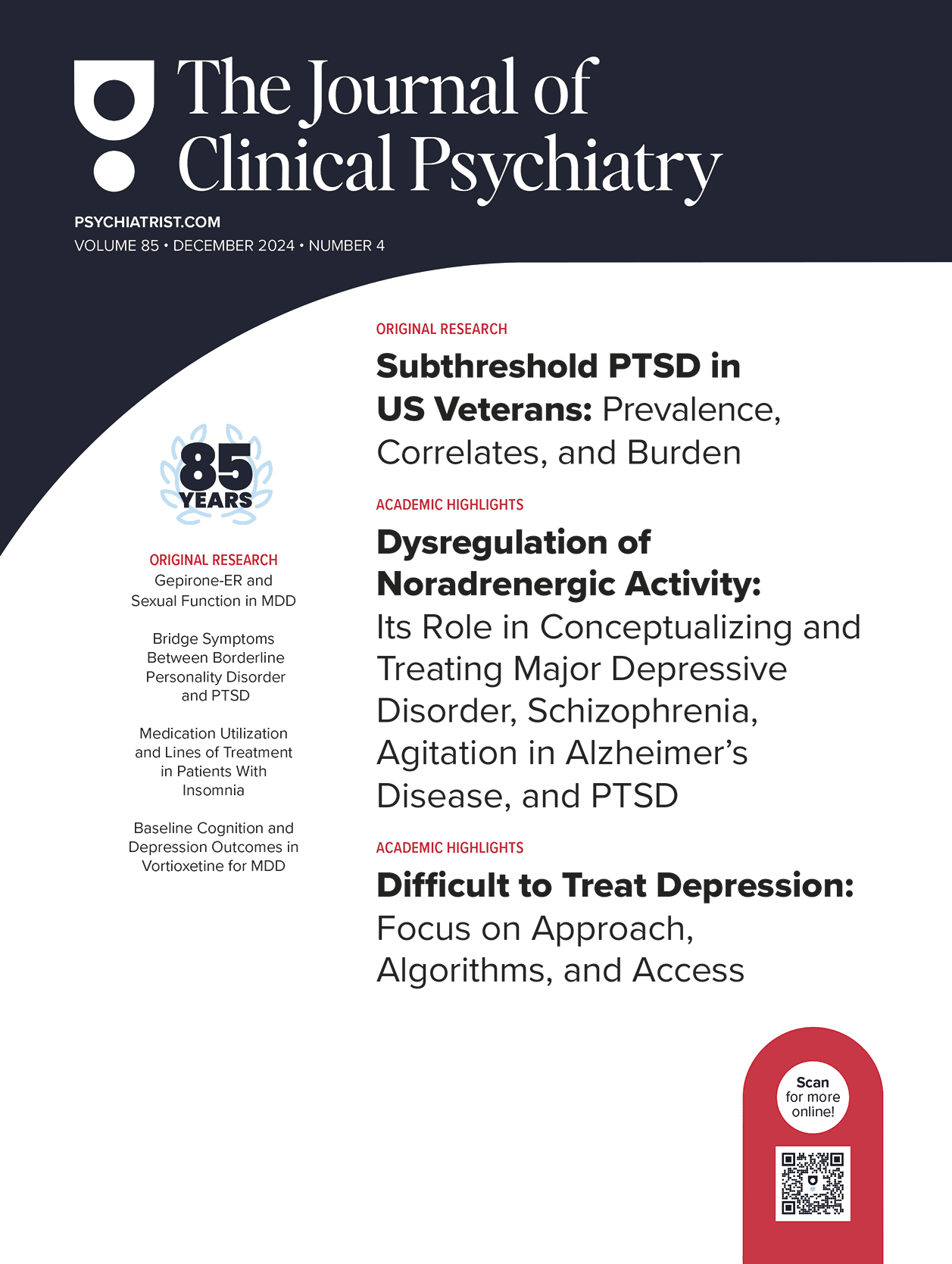‘ ‹’ ‹’ ‹
Because this piece does not have an abstract, we have provided for your benefit the first 3 sentences of the full text.
To the Editor: First, as reported by Dr Tofler, the death of a young woman (32 years) with bipolar illness by suicide is tragic. Second, we would like to address some of the queries raised about our study by Dr Tofler. Stability of the bipolar illness course for subjects participating in the study was defined by total scores of ≤ 8 on the Young Mania and Montgomery-Asberg Depression Rating Scales, maintenance medications for bipolar illness being used in stable doses (≥ 8 weeks), and no recent (≤ 6 months) hospitalization, emergency room visit, suicidal attempt, or aggressive or violent acts.’ ‹
See original letter by Tofler and article by Chengappa et al
This work may not be copied, distributed, displayed, published, reproduced, transmitted, modified, posted, sold, licensed, or used for commercial purposes. By downloading this file, you are agreeing to the publisher’s Terms & Conditions.
Dr Chengappa and Colleagues Reply
To the Editor: First, as reported by Dr Tofler, the death of a young woman (32 years) with bipolar illness by suicide is tragic. Second, we would like to address some of the queries raised about our study1 by Dr Tofler. Stability of the bipolar illness course for subjects participating in the study was defined by total scores of ≤ 8 on the Young Mania and Montgomery-Asberg Depression Rating Scales, maintenance medications for bipolar illness being used in stable doses (≥ 8 weeks), and no recent (≤ 6 months) hospitalization, emergency room visit, suicidal attempt, or aggressive or violent acts. Furthermore, clinicians were requested to refer patients whom they knew well and opined to be clinically stable in the past 6 months. Current or recent (3 months) substance or alcohol dependence was exclusionary.
As noted by Dr Tofler, certain adverse event (AE) frequencies for varenicline are higher than those reported in cessation studies done in other populations of smokers; however, the baseline for some AEs is relatively high in our study (see the Placebo AE column, Table 2).1(p769) Among other explanations, one is that frequency distributions of AEs can change considerably between treatments with just small numbers of subjects (in our case, N = 60) reporting an AE versus not. Moreover, the study was not statistically powered to test small to moderate effects for AEs, eg, depressed mood, as we point out in the discussion in the main paper.
As Dr Tofler underscores, this population of smokers is at high risk for potential suicidality, and only 6 of 60 bipolar subjects (10%) in our study did not have a life-time history of suicidal ideation/behavior, consistent with studies that have assessed this illness characteristic in smokers versus nonsmokers with bipolar illness (referenced in the discussion section1).
We have not attempted to “whitewash and minimize a potentially problematic intervention,” but in fact have recommended the opposite: being prudent and maintaining clinical vigilance for emergent psychiatric side effects (including suicidality) when initiating and continuing varenicline for smoking cessation (abstract and discussion sections1). All bipolar patients in our study were outpatients, and the recommendation by Dr Tofler that if varenicline were indicated for smoking cessation, it should be commenced in an inpatient setting (for at least a week) seems rather extreme, and in our opinion, cannot guarantee that this will prevent suicidality in bipolar patients.
Reference
1. Chengappa KNR, Perkins KA, Brar JS, et al. Varenicline for smoking cessation in bipolar disorder: a randomized, double-blind, placebo-controlled study. J Clin Psychiatry. 2014;75(7):765-772. PubMed doi:10.4088/JCP.13m08756
Author affiliations: Western Psychiatric Institute and Clinic, University of Pittsburgh Medical Center, Pittsburgh, Pennsylvania (Drs Chengappa, Perkins, Brar, and Levine); Dubois Regional Medical Center, Dubois, Pennsylvania (Dr Turkin); and Centre for Addiction and Mental Health, University of Toronto, Ontario, Canada (Dr George).
Potential conflicts of interest: As reported in the original article.1
Funding/support: As reported in the original article.1
J Clin Psychiatry 2015;76(5):625-626 (doi:10.4088/JCP.14lr09456a).
© Copyright 2015 Physicians Postgraduate Press, Inc.
This PDF is free for all visitors!
Save
Cite

